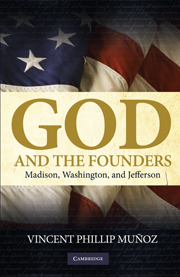Book contents
- Frontmatter
- Contents
- Acknowledgments
- Introduction: The Founders, Religious Freedom, and the First Amendment's Religion Clauses
- PART I THE FOUNDERS' CHURCH-STATE POLITICAL PHILOSOPHIES
- PART II THE FOUNDERS AND FIRST AMENDMENT RELIGION CLAUSES
- 4 Madison's, Washington's, and Jefferson's Church-State Doctrines
- 5 Madison, Washington, Jefferson, and the Establishment Clause
- 6 Madison, Washington, Jefferson, and the Free Exercise Clause
- 7 The Founders v. the Supreme Court
- Conclusion: The Founders and Church-State Jurisprudence
- Appendix A “Memorial and Remonstrance against Religious Assessments” by James Madison, 1785
- Appendix B A Bill “Establishing a Provision for Teachers of the Christian Religion” by Patrick Henry, 1784
- Appendix C A Bill for Establishing Religious Freedom in Virginia by Thomas Jefferson, 1777
- Index
4 - Madison's, Washington's, and Jefferson's Church-State Doctrines
Published online by Cambridge University Press: 05 June 2012
- Frontmatter
- Contents
- Acknowledgments
- Introduction: The Founders, Religious Freedom, and the First Amendment's Religion Clauses
- PART I THE FOUNDERS' CHURCH-STATE POLITICAL PHILOSOPHIES
- PART II THE FOUNDERS AND FIRST AMENDMENT RELIGION CLAUSES
- 4 Madison's, Washington's, and Jefferson's Church-State Doctrines
- 5 Madison, Washington, Jefferson, and the Establishment Clause
- 6 Madison, Washington, Jefferson, and the Free Exercise Clause
- 7 The Founders v. the Supreme Court
- Conclusion: The Founders and Church-State Jurisprudence
- Appendix A “Memorial and Remonstrance against Religious Assessments” by James Madison, 1785
- Appendix B A Bill “Establishing a Provision for Teachers of the Christian Religion” by Patrick Henry, 1784
- Appendix C A Bill for Establishing Religious Freedom in Virginia by Thomas Jefferson, 1777
- Index
Summary
The preceding three chapters attempted to articulate the different church-state political philosophies of James Madison, George Washington, and Thomas Jefferson. The next three chapters translate these philosophies into judicial doctrines and then apply those doctrines to leading church-state constitutional questions. Applying the Founders' approaches to legal cases helps to clarify their positions by showing how they might resolve specific constitutional questions. It also reveals how and when these leading Founders agree and disagree, which, in turn, can help us determine the degree to which their ideas remain relevant and persuasive today. This chapter attempts to deduce legal doctrines from each Founder. Chapters 5 and 6 apply those doctrines to Establishment Clause and Free Exercise Clause constitutional controversies, respectively.
THE FOUNDERS' CHURCH-STATE DOCTRINES
To apply the Founders' ideas to church-state constitutional controversies requires that their political theories be translated into legal doctrines. As constitutional scholar Keith E. Whittington states, “In order for the [Constitution's] text to serve as law, it must be rulelike.” The most useful judicial rules are sufficiently abstract to cover a multitude of similar situations yet specific enough to indicate a decision in a given case. Without requisite specificity and sufficient abstraction, those who interpret the Constitution are left without a standard or too vague of a standard to apply to a given set of circumstances. This necessarily increases the interpreter's discretion – which, for the judiciary, may or may not be attractive, depending on one's conception of the judicial role – but a corollary of increased discretion is decreased guidance by the rule that purportedly governs the case.
- Type
- Chapter
- Information
- God and the FoundersMadison, Washington, and Jefferson, pp. 119 - 126Publisher: Cambridge University PressPrint publication year: 2009

